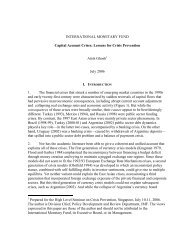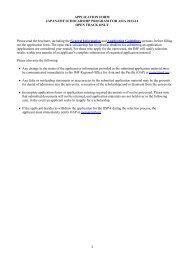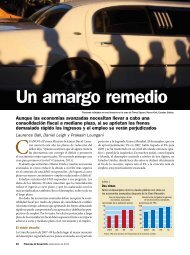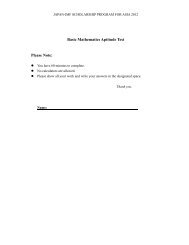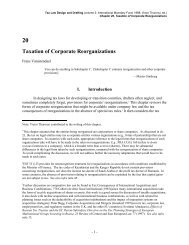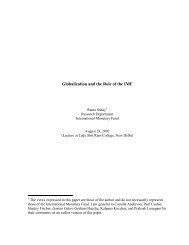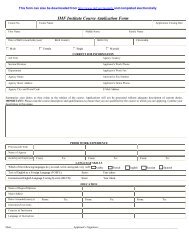Insolvency â why a special regime for banks? by Eva Hupkes ... - IMF
Insolvency â why a special regime for banks? by Eva Hupkes ... - IMF
Insolvency â why a special regime for banks? by Eva Hupkes ... - IMF
You also want an ePaper? Increase the reach of your titles
YUMPU automatically turns print PDFs into web optimized ePapers that Google loves.
and Second Banking Directives 138 . The Directive sets <strong>for</strong>th a <strong>regime</strong> <strong>for</strong> the mutual<br />
recognition within the European Union of reorganization measures and winding-up<br />
procedures applicable in a bank’s home country.<br />
However, this <strong>regime</strong> does not apply to third country institutions. The Directive respects the<br />
widely accepted principles of supervisory cooperation based on home country control drawn<br />
up <strong>by</strong> the Basel Committee on Banking Supervision and, as such, could provide inspiration<br />
<strong>for</strong> a more ambitious international bank insolvency <strong>regime</strong>. A intermediate approach, that<br />
would also <strong>for</strong> secondary proceedings in the host jurisdiction, could follow the model of the<br />
European <strong>Insolvency</strong> Regulation 139 or that set <strong>for</strong>th in the UNCITRAL Model Law 140 . The<br />
introduction of harmonized legal framework <strong>for</strong> the resolution of international bank<br />
insolvencies would not be possible without a binding international agreement. Un<strong>for</strong>tunately,<br />
however, such is unlikely to be achieved in the <strong>for</strong>eseeable future. A more realistic approach<br />
may be to facilitate international co-operation <strong>by</strong> providing in national laws the legal basis <strong>for</strong><br />
co-operation among the authorities involved and <strong>for</strong> recognition of <strong>for</strong>eign administrative and<br />
judicial decisions. 141<br />
The situation of a cross-border insolvency is made even more complex in the case of a<br />
multinational banking group with sister companies, subsidiaries, branches, and financial<br />
138 “Home country control” refers to home country administration of rules. Under the Second<br />
Banking Directive, which is not incorporated in the Directive 2000/12/EC, a bank established<br />
in any Member State may, subject to the minimum requirements set <strong>for</strong>th in EU legislation,<br />
provide services across borders or operate branches throughout the EU subject to home<br />
country rules and supervision. See Articles 13, 17,20(l)to (6), 22 and 26 of the Directive<br />
2000/12/EC of the European Parliament and of the Council of 20 March 2000 relating to the<br />
taking up and pursuit of the business of credit institutions, available via the Internet at<br />
http://europa.eu.int/eur-lex/en/consleg/pdf/2000/en_2000L0012_do_001.pdf.<br />
139 Council regulation (EC) No 1346/2000 of 29 May 2000 on insolvency proceedings,<br />
available via the internet at http://www.iiiglobal.org/country/european_union/regulation.pdf.<br />
The Regulation came into <strong>for</strong>ce on May 31, 2002. Its . baim is to improve the efficiency and<br />
effectiveness of insolvency proceedings which have a cross-border dimensions <strong>by</strong> providing a<br />
unified set of rules relating to the jurisdiction to commence insolvency proceedings, the<br />
recognition of insolvency proceedings and related judgments, the law applicable to insolvency<br />
proceedings and the provision of in<strong>for</strong>mation <strong>for</strong> creditors .The Regulation has direct effects<br />
in all member states of the European Union, with the exception of Denmark.<br />
140 Supra, note 129.<br />
141 Such approach is taken in the proposed amendment to Switzerland’s banking act (see<br />
supra note 35). With a view toward leaving as much leeway as possible <strong>for</strong> coordination<br />
between local and <strong>for</strong>eign proceedings, the proposal states as a general principle that the local<br />
liquidators should coordinate their actions with <strong>for</strong>eign liquidators should there be parallel<br />
proceedings under way in order to achieve the most efficient realization of the assets in a<br />
timely fashion. Due consideration should be given to the pari passu principle, that is, the equal<br />
treatment of all creditors. Creditors that participate in <strong>for</strong>eign proceedings must not be treated<br />
better than those that only participate in Swiss proceedings. The proposal further provides that<br />
if a <strong>for</strong>eign bank with branches in Switzerland becomes subject to <strong>for</strong>eign reorganization or<br />
insolvency proceedings, the Swiss Federal Banking Commission (SFBC) has the power to<br />
<strong>for</strong>mally recognize these measures taken <strong>by</strong> <strong>for</strong>eign regulatory or judicial authorities.<br />
30





